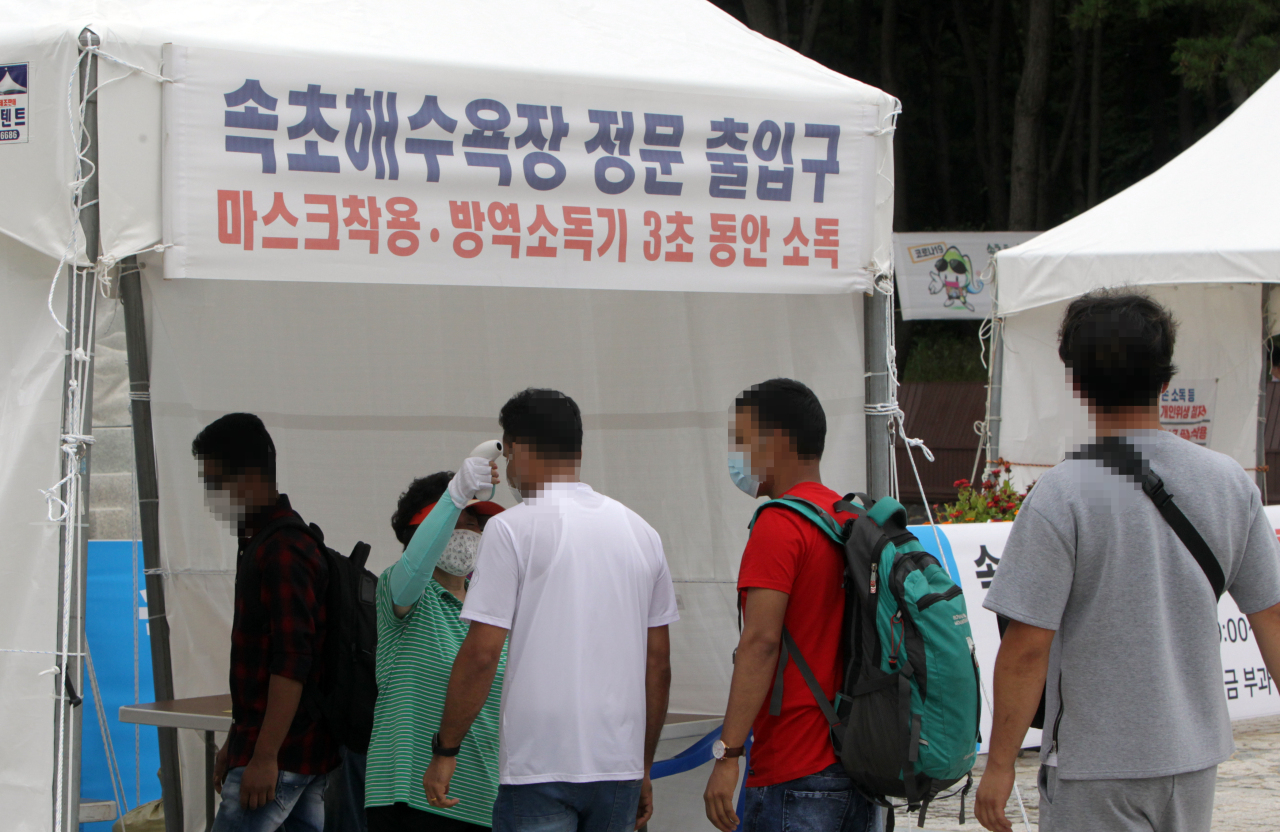South Korea’s coronavirus situation is stably under control with more than 80 percent of new cases confirmed to be under the government’s watch, health authorities said Monday, as the country reported only three locally-transmitted cases.
Korea reported 23 new COVID-19 cases on Monday, including 20 imported cases from overseas. The country’s total caseload as of Monday was 14,389, according to the Korea Centers for Disease Control and Prevention.
The number of domestically-transmitted cases marks the lowest since May 8 when the country reported just one local infection.
A new cluster of coronavirus infections emerged at a franchise coffee shop in southern Seoul. The initial patient visited the cafe on July 22 and then a restaurant a day later, infecting nine others so far.
The initial epidemiological study shows that the virus breakout at the cafe may be traceable to a camping site in Hongcheon, Gangwon Province, which was earlier identified as an infection cluster. A confirmed patient, who showed symptoms on July 26 and visited the camping site, stayed at the cafe for about 30 minutes on July 22, while the cafe cluster’s initial patiet was there.
The two persons didn’t sit next to each other. The inspection into how the virus spread between the two is underway.
A total of 10 people tested positive for the virus in connection with the camping site.
Of the locally transmitted cases, two were registered in Seoul and one from Gyeonggi Province, which surrounds the capital.
Imported cases have outnumbered local transmissions in recent weeks. For the past two weeks, 62.1 percent of the COVID-19 cases here came in from overseas, while 18.4 percent of the cases were locally transmitted. The transmission route for 6.6 percent of the cases were unidentified.
Of Monday’s 20 imported cases, 14 were from Asia – four from Bangladesh, four from Russia, two from the Philippines, two from Japan, one each from India, Iraq and Kazakhstan - and three from the Americas – two from the United States and one from Mexico. Two cases were from Algeria.
Fourteen of the imported cases were identified during the quarantine screening process at the border, while six were detected while under mandatory self-quarantine in Korea.
Starting Monday, sailors aboard ships from Russia are required to submit a certificate proving they tested negative for the coronavirus within 48 hours. This came amid a surge in cases linked to Russian ships docked in Korean ports.
Currently, the government requires international arrivals from six countries with a high infection rate -- Bangladesh, Pakistan, Kazakhstan, Kyrgyzstan, the Philippines and Uzbekistan –- to submit the certificate, with the list of the “high-risk” nations revised on a regular basis.
So far, 13,280 people, or 92.29 percent, have been released from quarantine upon making full recoveries, up 21 from a day earlier. Some 806 people are receiving medical treatment under quarantine. Thirteen people remain in serious or critical condition.
There were no additional deaths reported, with the death toll remaining at 301. The overall fatality rate stands at 2.09 percent -- 2.45 percent for men and 1.79 percent for women. The rate is much higher for those in their 80s and over -- 24.87 percent -- and those in their 70s -- 9.47 percent.
The KCDC said that 54.5 percent of those who died of the coronavirus here were infected at nursing homes, social welfare facilities and hospitals.
The country has carried out 1,579,757 tests since Jan. 3, with 17,401 people awaiting results as of Monday.
By Ock Hyun-ju (
laeticia.ock@heraldcorp.com)








![[Today’s K-pop] Blackpink’s Jennie, Lisa invited to Coachella as solo acts](http://res.heraldm.com/phpwas/restmb_idxmake.php?idx=644&simg=/content/image/2024/11/21/20241121050099_0.jpg)